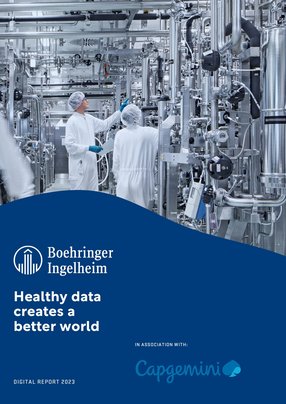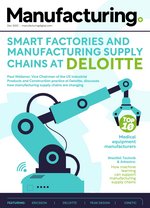Boehringer Ingelheim: Healthy data creates a better world
Humanity faces serious challenges in 2022: climate change threatens the planet; global health crises have exposed vulnerabilities in society; communities are being marginalised; and demographic trends are creating new pressures on healthcare worldwide. To meet these challenges, pioneering family-owned Boehringer Ingelheim is working on breakthrough therapies with the hope of transforming lives.
First established in Germany in 1885 and now one of the top 20 pharmaceutical companies in the world, Boehringer Ingelheim specialises in areas of unmet medical need in three business areas – Human Pharma, Animal Health, and Biopharmaceutical Contract Manufacturing.
Boehringer Ingelheim strives to develop better therapies, and enable better healthcare products and services to ensure we all live in a better world. The company has plans to increase the scope of its social and environmental ambitions, aiming to explore what more can be done to contribute to a sustainable world and a healthier future.
The company attributes its success to scientific innovation, including investments in sustainable healthcare and technology to accelerate industry improvements. Boehringer Ingelheim is currently pursuing more than 390 research collaborations in the life sciences community – representing more than 50% of its pipeline projects – and the company’s animal health business is now the second largest in the world, with more than 200 products for dogs, cats, horses, pigs, cattle and poultry.
To add this, Boehringer Ingelheim is also investing €35bn in health innovation to tackle non-communicable diseases, as well as an additional €250mn in partnerships to combat emerging infectious diseases. Through its flagship initiative Making More Health, it has partnered with Ashoka, the largest global network of social entrepreneurs. To mitigate the environmental impact of its growing business, Boehringer Ingelheim has committed to becoming carbon neutral in its operations and halving its resource footprint by 2030.
Driving innovation across the enterprise with advanced technologies
Boehringer Ingelheim is driving innovation across the enterprise and has focused on advanced technologies to discover new ways of introducing technology to core business processes. Big Data and analytics powered by AI allows the company to build new models and predictive tools that can have far-reaching impact on production processes, improving the quality, connectivity and availability of patient solutions.
Bruno Rizzuti joined Boehringer Ingelheim in 2014 and took up his role as Head of Data Management in 2020. "I moved into the pharmaceutical industry when I was very young," says Rizzuti. "I had been working as a consultant on analytical processing systems, working with many clients in the pharma industry – which is how I got to know the industry so well – and then moved to Boehringer Ingelheim."
Inclusiveness in the industry has been a draw for Rizzuti, being one of the main reasons he joined the industry. “Big Pharma companies listen to their employees, as well – this is something you can immediately tell when you join a pharma company,” says Rizzuti. “Whether at Boehringer Ingelheim or another company, the standard in the industry is that the employee's voice is heard, based on the notion that this is important because happy people give better results."
Innovation is another attractive, industry-wide aspect of the profession, according to Rizzuti. "You cannot survive in pharma if you don't innovate. You must innovate in new treatments and in new therapeutic areas. This is an industry that has innovation at its essence. And that also makes it a wonderful place to grow; you always have new challenges."
Migrating to the cloud is a journey and a huge paradigm shift
One of the biggest tech-related challenges facing the industry today is migrating to the cloud, not only from a technology perspective but also from a cultural perspective, says Rizzuti.
"When you embark on a journey to build an ecosystem and a data analytics platform that will serve you for the next five to 10 years, that’s a huge paradigm shift in comparison to how we've been doing things in analytics since the 80s and 90s."
The industry needs the kind of mindset changes that have already been introduced by data-driven professionals. “But you can't expect everybody in every position to have that mindset. One of the biggest changes that we're seeing nowadays is that it used to be enough for IT people to be on top of technology. Now, you need everybody on board to make such a change. And that requires an educational and cultural component in our IT roles.”
Rizzuti plays a key role in the area of data ingestion, which includes crucial data governance issues that should be incorporated into business planning at all stages, he says.
"Who will consume this data, for what purpose, and for how long? What are the different usages of this data? Having that in mind beforehand is key,” he explains. “Sometimes, people will jump into action without having a clear definition of who the data owner is, what the usage of this data will be, and what is the intended purpose – but all of that information is needed to provide the best tools to make the best of it. Otherwise, you end up having a 'data swamp' instead of a 'data lake', which eventually replicates errors from the past."
Global product teams work to uncover ideas and solutions
Boehringer Ingelheim has a workforce of more than 52,000 employees serving over 130 markets. In Germany, the company's New Therapeutic Concepts team in Biberach is introducing data and analytic tools to the early-stage drug discovery process. By working with some of the early findings and connecting those across projects, Boehringer Ingelheim can identify patterns that have the capacity to help multiple product teams uncover ideas and solutions that speed up the development process.
In Ingelheim, the company's Farmer team works with devices, data collection and systematic analytics to identify and isolate early signs of health problems that risk spreading through animal herds. The underlying data generated will simultaneously help identify inefficiencies that impact yields and farm productivity.
Meanwhile, the Mobinostics team is working with vets to develop mobile diagnostic and treatment solutions that allow greater reach and greater speed-to-treatment for remote farms all over the world.
Ingelheim is also home to the company's BRASS (Benefit Risk Assessment System) project, which uses AI to conduct an initial analysis of adverse reactions to medications that have already been approved – identifying potential side effects and undesirable events – and offer a valuable decision-making tool for those working in pharmacovigilance, helping them process each case more quickly.
In Vienna, Austria, Boehringer Ingelheim's Smart Process Design team is leveraging the power of data to strengthen yields in previously unpredictable biopharma manufacturing. Also in Vienna, the Biomarker-Based Patient Population project empowers experts within the company to identify biomarkers to better characterise patient populations for clinical studies. Being able to process and analyse large amounts of data creates the potential to select the right drug for a patient.
Based in Buenos Aires, Argentina, PetPro is one of the company's first digital products that directly addresses end users’ needs. PetPro Connect has been developed in close collaboration with the company's Animal Health business to connect pet owners and veterinarians, organise follow-up appointments via video chat, quickly and easily order medication refills, and benefit from bonus programmes.
Over in Spain, the company's Pathological Speech Processing team – based in Sant Cugat del Vallés, Barcelona – develops digital tools that facilitate the process of speech and language processing (SLP) by using machine learning and disease-customised algorithms. This will be used to analyse speech and language patterns, which can consequently be analysed to predict the development of mental diseases, such as the risk of dementia.
More Health, More Potential and More Green at Boehringer Ingelheim
Boehringer Ingelheim has defined three areas: More Health, More Potential and More Green – which are at the heart of a framework the company calls Sustainable Development For Generations. The framework incorporates established initiatives, building these into more ambitious goals to increase the company’s impact on health, society and the planet. In doing so, Boehringer Ingelheim generates greater long-term economic and social value for stakeholders, the communities they serve and employees.
Through these focus areas, Boehringer Ingelheim can contribute to the creation of solutions for global challenges and help enable sustainable change. The impact in each area reflects its core business and aligns with the United Nations’ Sustainable Development Goals (SDGs). Sustainable development goes hand-in-hand with the company’s planning principles of taking responsibility for communities and the environment.
Big Pharma has big aims and ambitions, providing a daily incentive for everyone working in the industry at every level. "We work to make humanity better, right?" asks Rizzuti. "To make the lives of people and animals better every day. That's a difficult model to reject. It's definitely something that immediately gives you a sense of purpose when you're working in such an industry. It's a life science; it's all about taking care of people, taking care of animals.”



